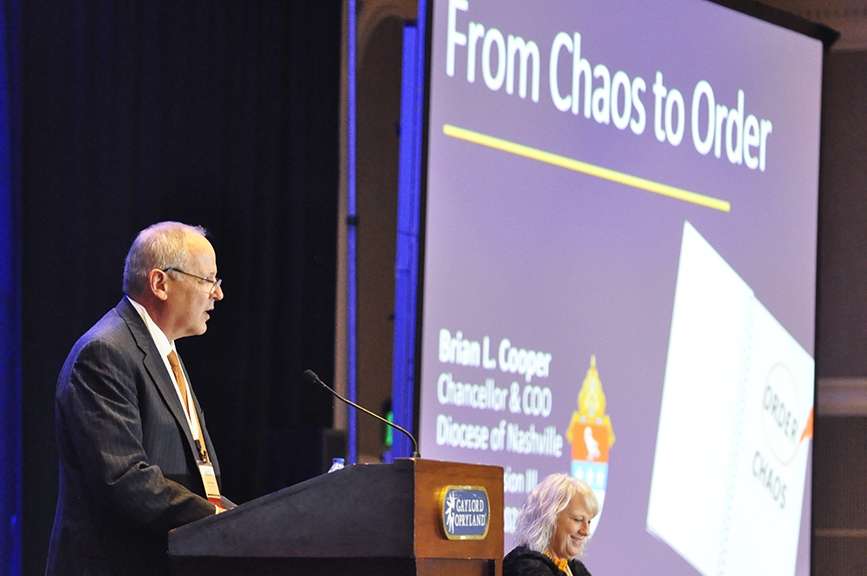
The successful management of the Diocese of Nashville operations and ministries were on display at a recent meeting of the diocesan financial managers from across the country and beyond.
“Our ultimate goal is to bring souls to Jesus Christ,” Brian Cooper, Chancellor and Chief Operating Officer of the Diocese of Nashville, said in his talk during one of the general sessions of the annual meeting of the Diocesan Fiscal Managers Conference held earlier this month at the Gaylord Opryland Hotel and Resort in Nashville.
Cooper’s talk about the diocesan staff’s strategic and financial planning processes to the 500 people attending the annual meeting was titled: “From Chaos to Order: Creating a Ministry and Staff Planning Approach that Optimizes Resources and Achieve Church Mission with Transparency and Accountability.”
The question facing dioceses, Cooper said, is how can we apply a business mindset to advance the diocese’s mission of evangelization and care for the most vulnerable? The answer, he said, is to create a ministry and staff management approach that optimizes resources and achieves the mission with transparency and accountability.
The keys to a successful ministry plan, Cooper said, are: challenging and measurable annual goals and objectives; individual goals based on department/ministry objectives; monthly performance management, tracking and review; and an integrated annual performance review and merit process.
The important cultural attributes that lead to success are focus, teamwork and communication, Cooper said. “These attributes are always present in any successful organization.”
During his talk, Cooper surveyed the audience about which of the three attributes was the hardest to achieve, and the answer was communication.
“Good communication is the bridge between confusion and clarity,” Cooper said.
Every member of the diocesan staff must see how their work serves the diocese’s mission, Cooper said.
The diocese’s process fuses ministry planning with annual budgeting, Cooper explained. The key is having SMART goals: specific, measurable, actionable, relevant and timely.
Using the process has led to several successes in the Diocese of Nashville, Cooper noted, citing: an 11.7 percent increase in Catholic school enrollment in the last three years compared to an 8.4 percent decrease over the previous five years; a 19 percent increase in average weekly parish collections; a 38 percent increase in the per capita average in the Bishop’s Annual Appeal for Ministries; and a 56 percent jump in the number of seminarians and deacon candidates in formation.
“The Lord’s given us the grace to succeed and the Holy Spirit to walk with us,” Cooper said. “But we must choose to take those first steps.”
Bill Whalen, the diocesan Chief Financial Officer who served as the host of the meeting with Bishop J. Mark Spalding, led a session talking about the success of the diocese’s Catholic Community Investment and Loan fund.
The fund pools deposits from the parishes, schools, and other entities in the diocese and invests them. The earnings are used to pay returns on savings and checking accounts and other deposits that are above market averages. The returns also provide money for the diocese to loan to parishes and schools as well as to donate for use by a variety of diocesan ministries, Whalen explained.
Father John Hammond, the a Vicar General and the Judicial Vicar for the diocese, and Matt Pietsch, the diocese’s Associate General Counsel, led a session about the canon and civil law requirements on the retention of documents.
Along with Bishop Spalding acting as one of the hosts for the meeting, several other bishops were also on hand for the conference, including Bishop Barry Knestout of Richmond, Virginia, the episcopal moderator of the Diocesan Fiscal Management Conference, Bishop Edward Scharfenberger of Albany, New York, and Archbishop Philip Anyolo of the Archdiocese of Kisumu, Kenya.









